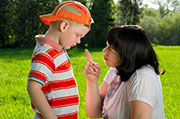- Big Health Care Disparities Persist Across the U.S., New Report Finds
- Teens Often Bullied Online About Their Weight: Study
- Work That Challenges Your Brain Helps You Stay Sharp With Age
- Urine Test Might Spot Head-and-Neck Cancers Early
- Many Seniors Are Overmedicated, But ChatGPT Might Prevent That
- Antipsychotics May Do Great Harm to People With Dementia: Report
- Two-Drug Combo Curbs Drinking for People Battling Severe Alcoholism
- Most Homeless Americans Are Battling Mental Illness
- FDA Recalls Heart Failure Devices Linked to Injuries and Deaths
- COVID Does Not Spur Asthma in Kids, Study Finds
Cold, Abusive Parenting May Set Child Up for Health Woes as Adult


FRIDAY, Oct. 4Adults who suffered childhood abuse and whose parents didn’t show them affection are at increased risk for numerous types of health problems, a new study finds.
Researchers looked at 18 markers of health risk in 756 adults, including blood pressure, heart rate, stress hormone levels, cholesterol, waist circumference and blood sugar regulation. Each of these markers was given a score and these scores were added up to determine a person’s risk for health problems. Those with higher scores were at greater risk.
The results showed a significant link between childhood abuse and increased risk of health problems. People who reported high levels of childhood abuse and low levels of parental affection had the highest risk, according to the study published online recently in the Proceedings of the National Academy of Sciences.
The researchers also found that adults who reported higher amounts of parental affection during childhood were at lower risk for health problems.
“Our findings suggest that there may be a way to reduce the impact abuse has, at least in terms of physical health,” study author Judith Carroll, a research scientist at the Cousins Center for Psychoneuroimmunology at the University of California, Los Angeles, said in a UCLA news release.
“If the child has love from parental figures, they may be more protected from the impact of abuse on adult biological risk for health problems than those who don’t have that loving adult in their life,” she explained.
The mental strain of abuse or having unloving parents may change a child’s neural responses to stress, increasing the emotional and physical arousal to threat and making it more difficult for that reaction to be shut off, according to the researchers.
“Our findings highlight the extent to which these early childhood experiences are associated with evidence of increased biological risks across nearly all of the body’s major regulatory systems,” study senior author Teresa Seeman, a professor of medicine at the David Geffen School of Medicine at the University of California, Los Angeles, said in the news release.
“If we only look at individual biological parameters such as blood pressure or cholesterol, we would miss the fact that the early childhood experiences are related to a much broader set of biological risk indicators — suggesting the range of health risks that may result from such adverse childhood exposures.”
While the study showed an association between bad parenting and a child’s later health, it did not establish a direct cause-and-effect relationship, the authors noted.
More information
The American Academy of Pediatrics has more about child abuse.
Source: HealthDay
Copyright © 2024 HealthDay. All rights reserved.










